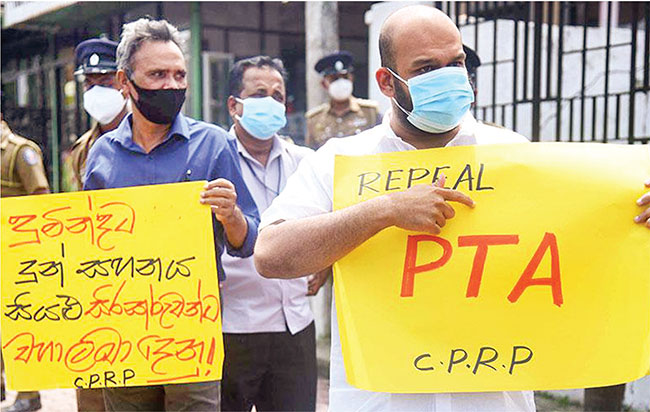SPECIAL REPORT : Part 400
Yugadanavi legal wrangle:
By Shamindra Ferdinando
The Sri Lanka Podujana Peramuna (SLPP) government faces an overwhelming challenge from within, at the beginning of the New Year. The continuing dispute between the SLPP and a section of its constituent parties is threatening to overwhelm the ruling coalition over the backdoor offer by the New York-based US Company to purchase a 40 percent stake in Yugadanavi Power Plant, along with an almost monopoly status to supply LNG.
The SLPP appeared to have been caught off guard by three ministers, Vasudeva Nanayakkara (General Secretary, Democratic Left Front), Wimal Weerawansa (Leader, the National Freedom Front) and Attorney-at-Law Udaya Gammanpila (Leader, the Pivithuru Hela Urumaya), throwing their weight behind petitions against the deal. The three constituents have eight lawmakers in Parliament.
The Supreme Court will resume hearing the Fundamental Rights petitions challenging the Yugadanavi-related deals in the second week of January. A fuller bench of the SC heard those petitions on Dec 16 and 17, 2021. The next hearing is set for January 10, 2022, before a five-judge-bench consisting of Chief Justice Jayantha Jayasuriya, Justice Buwaneka Aluwihare, Justice Priyantha Jayawardena, Justice Vijith Malalgoda and Justice L.T.B. Dehideniya.
The Yugadanavi hearing will resume a week before Parliament meets again, following the much-debated prorogation. The President resorted to a tactical move in the wake of Janatha Vimukthi Peramuna (JVP) leader Anura Kumara Dissanayake tabling the hither to secret Yugadanavi agreement. The JVPer delivered a knockout blow a few hours before the vote on the 2022 Budget on Dec 10 evening.
President Gotabaya Rajapaksa prorogued Parliament immediately after the House approved the 2022 Budget. The Parliament is scheduled to meet again on January 18. Whatever the outcome of the Yugadanavi case, it’ll deliver a debilitating setback to the ruling coalition, struggling on several fronts. However, the relations between the two groups, in the coalition, have deteriorated so much, the SLPP and the rebellious partners may not be in a position to resolve their differences, out of Court. And if the differences are irreconcilable within the SLPP, the breakup of the coalition may become inevitable, especially with other dissenters in its own ranks, smarting from the fact they did not get any Cabinet portfolios to use the opportunity to teach the ruling clique a lesson. But they may very well end up cutting their proverbial nose to spite the face. But since the rebels took a principled and not a spiteful stand on the issue, both the President and PM will likely treat the partner rebellion as a storm in a tea cup. Premier Mahinda Rajapaksa has already stated in public that the rebel coalition partners have a right to dissent.
The declaration that Attorney General Sanjay Rajaratnam, PC, wouldn’t appear for the three ministers supporting the challenge, however, underscored the crisis within the government. They have retained private Counsel.
In addition to Prime Minister Mahinda Rajapaksa, the Cabinet of Ministers, New Fortress Energy Inc., West Coast Power (Private) Limited, the Ceylon Electricity Board, the AG is a respondent in this case.
The case is heard in terms of Article 132(3) of the Constitution. The petitioners are Samagi Jana Balavegaya General Secretary Ranjith Madduma Bandara, former JVP Parliamentarians Sunil
Hadunneththi and Wasantha Samarasinghe, Archbishop of Colombo Malcolm Cardinal Ranjith, Ven. Elle Gunawansa Thera and Viduli Sevaka Sangamaya have moved the Supreme Court against the agreements between the government and New Fortress Energy Inc., in relation to the sale of 40% of the shares of Yugadanavi Power Plant, located at Kerawalapitiya.
The petitioners said on 7th of July 2021, the framework agreement was signed between the government of Sri Lanka and New Fortress Energy Inc., for the disposal of 40% of the total shares held by West Coast Power (Private) Limited in the Yugadanavi (Pvt) Ltd for USD 250 million. Critics have repeatedly pointed out that there was nothing wrong in selling the 40 percent stake for that amount, the problem lay in the fact that New Fortress was also getting a monopoly status to supply LNG, ostensibly for five years, at the beginning, but who knows what would happen later on once they get themselves entrenched here with the corrupt bureaucracy and politicians.
Earlier both the CEB and Telecom were wrangled in so many corrupt deals, especially involving certain French multi-nationals, but many of them were undone especially during the tenure of former Prime Minister Ranil Wickremesinghe in the 1990s. Such deals were a drain on the private sector-friendly UNP government. So finally Western lenders themselves told the French enough was enough. It was a case of French selling us outdated equipment and charging us premium prices to keep them going. For example in those days after each heavy downpour many telephone lines in the country would go dead, but luckily for us all that was corrected with the privatisation of Telecom by Minister Mangala Samaraweera and clipping of the wings of the then all-powerful trade union UPTO. It was a classic case of trapping them using their greed.
The petitioners said agreements had been further entered for the execution of the Terminal Project which includes Floating Storage Regasification Unit (FSRU), Mooring system and the Pipelines, and the supply of Liquefied Natural Gas (LNG) to West Coast Power (Pvt) Ltd.
They state that to the best of their knowledge, the Share Sales and Purchase Agreement (SSPA) pertaining for the sale of 40% of the shares in West Coast Power (Pvt) Ltd., and the Gas Supply Agreements have not been placed before the Cabinet of Ministers to date.
Bundling the contracts for the Liquefied Natural Gas (LNG) terminal, construction of pipelines and Liquefied Natural Gas (LNG) supply in a single unsolicited proposal and awarding them to a foreign-based company, without following a transparent procedure, poses a serious threat to the national energy security of the country, they point out.
They said the proposal to purchase 40% of the shares in the West Coast Power (Private) Limited is contrary to the National Energy Policy and Strategies.
Manohara and Romesh on
opposing sides
Perhaps, the top SLPP leadership believed the trio wouldn’t go the whole hog though they opposed the deal. However, following consultations among the rebel group, the DLF, NFF and PHU decided to challenge the Cabinet of ministers in the Supreme Court even at the risk of losing their ministerial portfolios. Their relationship with the dominant partner has been damaged severely. In fact, irreparable damage may have been caused.
When the writer sought an explanation from Minister Gammanpila, one-time heavyweight of the Jathika Hela Urumaya (JHU), the lawmaker didn’t mince his words. “Whatever happens, we cannot remain committed to the so called collective responsibility of the Cabinet at the expense of national interest.
Dismissing the Attorney General’s stand vis-a-vis the defiant ministerial group, lawmaker Gammanpila declared that either those (three ministers) or the Attorney General had lied to the Supreme Court in respect of the Yugadanavi deal. Underscoring the fact that both represented the government, lawyer Gammanpila pointed out that in case the Supreme Court ruled one party furnished falsehood in an affidavit that party faced a three-year prison term.
The five-judge bench dismissed the Attorney General’s assertion that as the fundamental rights cases hadn’t been filed within the stipulated period, they should be dismissed. Having proposed to conduct proceedings on Dec 21 and 22 following hearings on Dec 16 and 17, judges put off the proceedings to January 10, 2022, on a request by the Attorney General. If not for the Attorney General’s plea, a lot more would have been in the public domain now.
Two of the country’s top lawyers, Manohara de Silva, PC and Romesh de Silva, PC, appeared for the opposing sides. Manohara, who openly campaigned against the yahapalana lot, appeared for petitioner Lanka Viduli Sevaka Sangamaya whereas Romesh represented respondent the Ceylon Electricity Board (CEB). The case has taken an unexpected turn with the disclosure of CEB Chairman M.C. Ferdinando’s controversial role in the whole process, particularly his endorsement of the agreement as an Advisor to the Finance Ministry. Ferdinando is the seventh among 73 respondents named in a petition filed by 12 persons represented by Manohara de Silva, PC. Interestingly, three Commissioners of the CIABOC (Commission to Investigate Allegations of Bribery or Corruption) are among the respondents.
What really made the submissions made by Manohara and Romesh interesting was their role in the new Constitution making process. The nine member expert team tasked with producing a draft constitution consists of Romesh de Silva (Chairperson), Gamini Marapana PC, Manohara de Silva PC, Sanjeewa Jayawardena PC, Prof. Naseema Kamurdeen, Dr. A. Sarveshwaran, Samantha Ratwatte PC, Prof. Wasantha Seneviratne and Prof. G.H. Peiris.
They haven’t been able to bring the process to a successful conclusion so far though the government repeatedly assured both in and out of Parliament, the draft Constitution would be presented by President Gotabaya Rajapaksa before completing two years in office. That failure cannot be blamed on the Covid-19 global epidemic. Silly efforts to blame everything on Covid-19 reached a new level when Provincial Council and Local Government State Minister Roshan Ranasinghe asserted that Local Government polls scheduled to take place before the third week of March 2022 was unlikely due to the threat posed by the new COVID variant Omicron.
Before examination of submissions made before the Supreme Court, it would be pertinent to mention that the Attorney General conceded before the five-judge bench the agreement on energy didn’t come within the laid down procurement process. The Attorney General, however, took up the stand that there is no basis for the case. Uditha Igalahewa, PC, appeared for the ministers.
Manohara issues dire warning
The Counsel for Lanka Viduli Sevaka Sangamaya has asserted in court that the Yugadanavi deal posed quite a threat to the sovereignty of the country as well as its national security. In response to Manohara’s warning, Attorney General Sanjaya Rajaratnam asked for the dismissal of cases without hearing them. The request was made on the basis the agreement being challenged outside the time allocated in terms of the Constitution. Manohara alleged that the then US Ambassador Alaina Teplitz interfered by lobbying on behalf of the US-based New Fortress Energy. Teplitiz, who recently completed her term in Colombo, had made representations on June 22, 2020, on behalf of the US Company to the Presidential Secretariat. The latter, in turn, has sent the US proposal to the Power and Energy Secretary along with a letter dated Jun 24, 2020. The letters signed by Telpitz and Dr. P.B. Jayasundera, respectively, for the US Embassy and the Presidential Secretariat have been presented to the Court. Manohara brought to the notice of the Court how the proposal made outside the laid down process undermined stability.
Accusing the US of interference in domestic affairs, Manohara explained how the US Ambassador sought to achieve their objectives with the help of corrupt Sri Lankan officials. This deal would create a US monopoly in the supply of LNG to Sri Lanka, Manohara predicted, asserting that the project created a dangerous situation. Alleging that the agreement betrayed national interests, the legal luminary painted a bleak picture of Sri Lanka’s future in case the deal materialised. Manohara questioned how the government entered into the agreement at the behest of the US even before the Chief Government Valuer provided his assessment pertaining to the Yugadanavi Power Plant. Romesh de Silva responded asserting that a proper valuation had been done before the signing of the agreement took place.
Those who were represented by Manohara in their petition stated that the Ceylon Electricity Board informed the Secretary to the Ministry of Power by letter dated 07.07.2021 that competitive open international tendering for the supply of Liquefied Natural Gas to Sri Lanka had already commenced and that to entertain an arbitrary proposal presented by an independent party who is not a party to the procurement process would adversely affect the transparency and fairness of the procurement process. In spite of that, Treasury Secretary S.R. Attygalle signed the Framework Agreement on July 07, 2021, to pave the way the sale of 40 percent shares of the power station owned by the government.
The share structure of the power station comprises; the government 50%, Employees’ Provident Fund 27%, Lanka Electricity Company 18% and LTL Holdings 5%.
SLFP takes questionable stand
In spite of backing the rebel ministers’ cause against the Sri Lanka-US deal, the Sri Lanka Freedom Party (SLFP) conveniently skipped an opportunity to join the Supreme Court action. The SLFP parliamentary group consists of 14 members. The second biggest constituent in the 145-member government Parliamentary Group, the SLFP owed an explanation why at least one of its ministers, out of the two, namely Nimal Siripala de Silva or Mahinda Amaraweera failed to join the rebellious colleagues, Vasudeva Nanayakkara, Wimal Weerawansa and Udaya Gammanpila, in their principled stand against the controversial deal. General Secretary of the SLFP Dayasiri Jayasekera, however, flayed Yugadanavi agreement at the launch of a high profile campaign, on Oct 29, at Solis Hall, Pitakotte.
In an interview with political weekly Anidda in its Dec 26, 2021 edition, lawmaker Jayasekera, having challenged the legality of the Yugadanavi deal, vowed not to allow the implementation of the energy project, under any circumstances. The SLFPer strongly rejected the stand taken by Chief Government Whip Johnston Fernando as regards the Yugadanavi agreement.
If the SLFP is sincere of its position vis-a-vis the US energy deal, former President Maithripala Sirisena, MP, should have given his party the go ahead to join the challenge in the Supreme Court. The SLFP’s participation in legal action would have certainly strengthened the case against the Cabinet of ministers. Anidda interviewer should have sought an explanation from lawmaker Jayasekera over the SLFP not being part of the real opposition to the Yugadanavi deal.
Veteran politician Vasudeva Nanayakkara recently referred to those who backed Yugadanavi, opposed it and then took a sort of neutral stand. Was he referring to the SLFP? In addition to the DLF, the NFF and the PHU that have challenged the Cabinet of ministers over the Yugadanavi deal, SLFP, Communist Party, LSSP, Yuthukama civil society and National List MP Tiran Alles have declared opposition to the same. Of the 225 lawmakers, approximately 25 elected and appointed on the SLPP National List are believed to be opposed in line with the decision taken by their respective parties. In addition to them, Ven. Athureliye Rathana, National List MP of Ape Jana Bala Pakshaya backs the campaign.
A govt. in turmoil
The Yugadanavi crisis is just one among a spate of issues gravely troubling the government. The cash-strapped regime sought to project the Yugadanavi deal as a success primarily on the basis it would please the ever antagonistic Washington and the US firm paying USD 250 mn in two installments. Those who support the project propagate the line or lie that the deal would make available electricity at a much cheaper rate. There had never been a previous agreement that ended up having a section of Cabinet ministers who represent the legislature moving Court against their colleagues. The issue should be examined taking into consideration that the President is the head of the Cabinet. Where does the President stand? Did the appearance of CEB Chairman M.C. Ferdinando at a special media briefing arranged by the Presidential Media Division (PMD) signifies the President’s stand? In case the Supreme Court ruling pertaining to Yugadanavi petitions goes against the government, what will it do? Is there a fallback position? What will become of the SLPP’s relationship with those who opposed the project?
The much-debated ‘One Country, One Law’ concept has caused controversy primarily due to the appointment of Ven. Galagodaatte Gnanasara Thera, the recipient of presidential pardon from previous President Sirisena, after his ruffian behaviour even in a court of law, as the head of the relevant Presidential Task Force. The handling of State Minister Ratwatte’s inexcusable behaviour at the Welikada and Anuradhapura prisons badly exposed the government.
The government will have to address a series of other issues with the daunting challenge in servicing foreign and local debt as well as ruination of the Maha crop as a result of the hasty ban on agro-chemicals. The sacking of Agriculture Secretary Senior Prof. Udith J. Jayasinghe has prompted the angry official to fire a broadside at the government. The government appeared to have been sort of surprised by Prof. Jasasinghe’s response. The SJB has lambasted Prof. Jayasinghe and held him and the SLPP political leadership responsible for the crisis whereas the former now portrayed himself as the one who represented the interests of the public.
The government cannot depend on its overwhelming parliamentary majority to overcome the crises. Actually, the near 2/3 majority does not mean a thing as the government continues to weaken itself by utterly misplaced strategies. The SLPP is in such a desperate situation, the situation cannot be overcome or public attention diverted by propaganda on mainstream or social media.

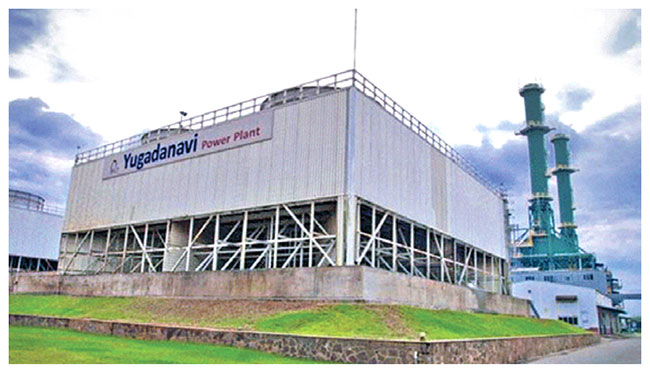
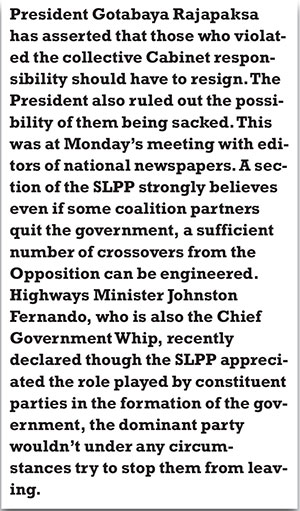 Perhaps, the top SLPP leadership believed the trio wouldn’t go the whole hog though they opposed the deal. However, following consultations among the rebel group, the DLF, NFF and PHU decided to challenge the Cabinet of ministers in the Supreme Court even at the risk of losing their ministerial portfolios. Their relationship with the dominant partner has been damaged severely. In fact, irreparable damage may have been caused.
Perhaps, the top SLPP leadership believed the trio wouldn’t go the whole hog though they opposed the deal. However, following consultations among the rebel group, the DLF, NFF and PHU decided to challenge the Cabinet of ministers in the Supreme Court even at the risk of losing their ministerial portfolios. Their relationship with the dominant partner has been damaged severely. In fact, irreparable damage may have been caused.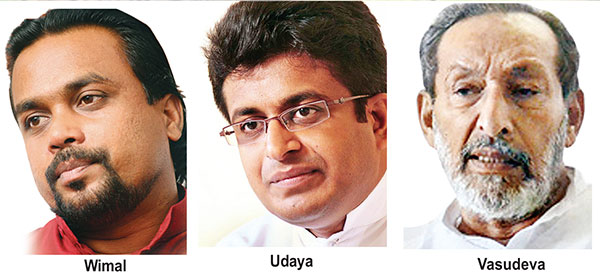
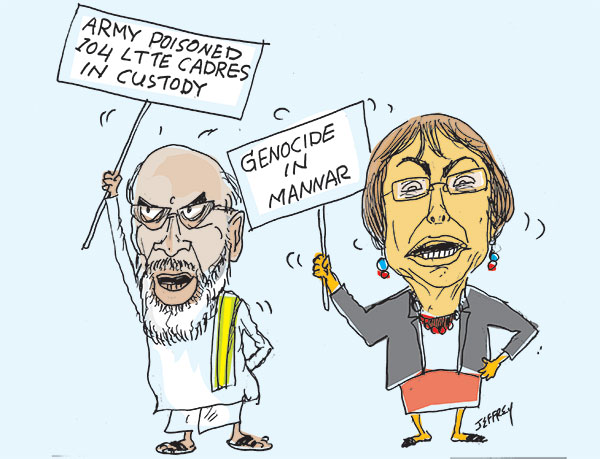
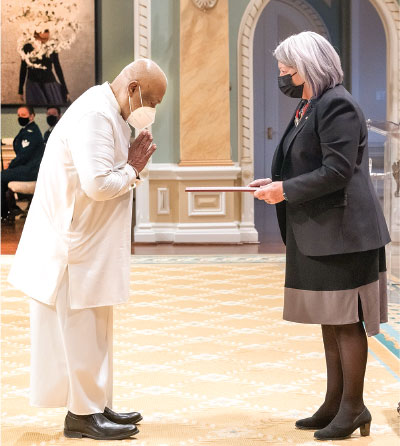 Harsha Kumara Navaratne pictured with the Governor General of Canada, Mary May Simon at a ceremony held at the Rideau Hall in Ottawa on Dec 07, 2021, after the new HC, presented his credentials as Sri Lanka’s High Commissioner(pic courtesy Foreign Ministry)
Harsha Kumara Navaratne pictured with the Governor General of Canada, Mary May Simon at a ceremony held at the Rideau Hall in Ottawa on Dec 07, 2021, after the new HC, presented his credentials as Sri Lanka’s High Commissioner(pic courtesy Foreign Ministry)